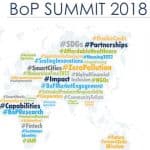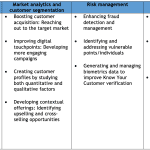NexThought Monday: Marking a Shift at the BOP World Convention
What is the catalyst that can mainstream the BOP?
We hoped big companies would develop these markets. Then we hoped social entrepreneurs would scale successful solutions, or that governments would create the conditions that support bottom-up growth. But it’s fair to say that, despite many individual successes, none of the above has so far proven to be transformative for the base of the pyramid.
Maybe we need to think a bit more orthogonally. Two years ago, in Singapore, the BOP World Convention & Expo explored cross-sector partnerships and hybrid models as potential catalysts. This year, the convention will focus on inclusive economies, what can drive them, and their implications for the BoP. What we mean by an inclusive economy is one that makes basic goods and services available to all, when and where they need them, and is equally inclusive of the opportunity to be a provider. If it included BoP customers and providers – if the market mechanisms worked at nearly all levels of income – that would have a mainstreaming effect. And it’s possible that we already have early examples of such market mechanisms, even if their potential for transforming BoP markets is not widely recognized.
I’m talking about the cloud-based IT platforms that enable on-demand services – early examples of which include Uber, Airbnb and their competitors. But on-demand models are expanding into office space (WeWork), financial services (M-Pesa, Square, Klarna), retail (Amazon and AliBaba) and others. Blockchain platforms – the technology behind Bitcoin – have the potential to transform banking, legal services such as contract management, and public sector administrative services (land title transfers); other nascent models are appearing in agriculture, health care and education. Such platforms, combined with smart mobile tools, have the potential to transform how we live and work in sector after sector.
Excepting M-Pesa, none of these are yet BoP businesses in the strict sense of the term. But a key characteristic of these cloud-based platform models is greater efficiency, enabling lower costs as well as larger markets, which is why they are disruptive of traditional market structures. These kinds of platforms are also inherently more inclusive – both for service providers and for customers: an algorithm doesn’t care about your skin color, your caste, your religion, just whether you can pay for or provide a service.
Mobile broadband networks increasingly cover even rural areas. Ownership of smart devices among BoP populations is accelerating – within five years, likely every mobile phone will be a smart phone with internet capability. Drones and driverless delivery vehicles may improve product and service delivery even to remote communities. As a result, BoP households will increasingly have access to cloud-based platforms, and the lure of another several billion customers is likely to drive efforts to include them in such service networks – indeed, Facebook is already actively seeking to do so.
So is it plausible that inclusive, cloud-based platforms will increasingly mainstream the low-income households that comprise the BoP – offering them access to a wider range of modern services, as well as new opportunities as service providers? That is what this year’s BOP Summit, set for Sept. 20-22 in Singapore, will explore.
It will present current trends in many sectors, explore promising models that are already gaining traction in the BoP, and discuss others that are poised to transform opportunities for low-income populations while opening new markets for both social entrepreneurial ventures and established corporations.
If you have pertinent expertise or insights to share, or want to learn about these new market opportunities, we invite you to attend.
Top image: Exhibitor iDE shows off its SanBox, a low-cost toilet system. (Images courtesy of BOP World Convention & Expo)
Al Hammond is senior entrepreneur and leader of the Health for All program at Ashoka.
- Categories
- Education, Social Enterprise, Technology



